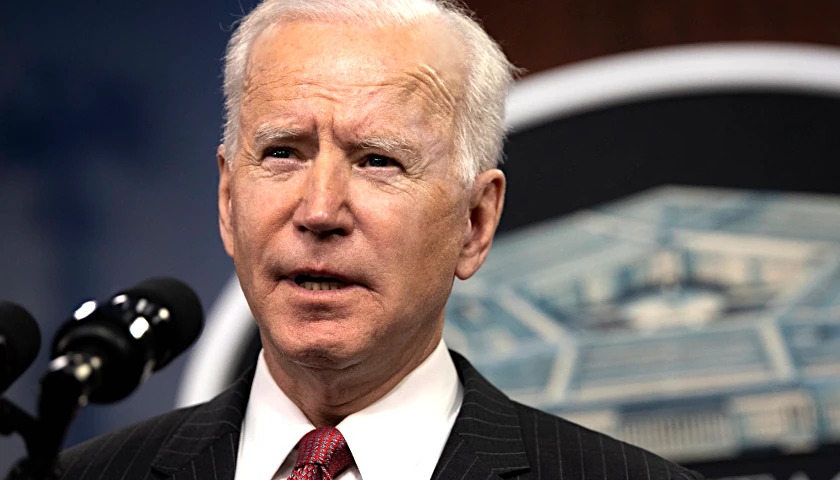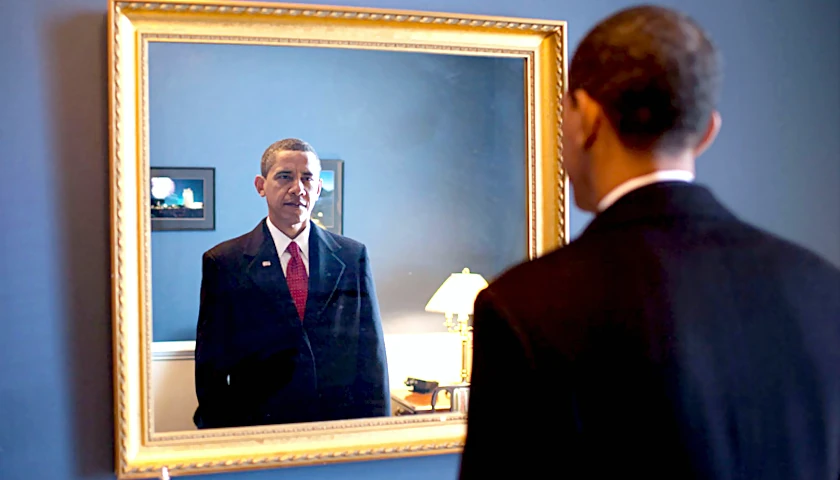Live from Music Row Monday morning on The Tennessee Star Report with Michael Patrick Leahy – broadcast on Nashville’s Talk Radio 98.3 and 1510 WLAC weekdays from 5:00 a.m. to 8:00 a.m. – host Leahy welcomed the original all-star panelist Crom Carmichael to the studio.
During the third hour, Carmichael discussed the parallels between the Great Depression and the current recession and questions whether or not FDR would have been considered a great president had it not been for Adolph Hitler.
Leahy: We are 29 days away from the big election on November 3rd pitting Joe Biden against incumbent President Donald Trump. You know, I’m looking at this crime and it seems to me that the current Democratic party is not your grandfather’s Democratic party. The Democrats became a sort of the party the little guy supposedly.
But this back end, you know Franklin Delano Roosevelt in the era of the New Deal who served as president from 1933 to 1945 and led the country through most of World War II, you know, he died. He was only 63 years old when he died in 1945. It seems like a young man. But now we have 77-year-old Joe Biden leading the Democratic Party. He said on the debate he is the Democratic party. It seems to me that there’s a big difference, but maybe you could advise me a little bit more about this between those Democratic parties.
Carmichael: A great question is for me is would FDR been a great president had it not been for Hitler? And the answer is he would not have been a great president. He would have been a very flawed president. And I think it’s very important that our audience understand why. By the way, here’s a great trivia question. This is a little bit like I ask people who claim to have been Yankee fans back in 1960. I was a huge Yankees fan. Mickey Mantle was my guy
Leahy: Mickey Mantle.
Carmichael: Yeah, and so it might my question is to anybody who says they were Yankee fan when mantle and Maris had all those home runs. The question is who played left field for the Yankees when Mannis was center.
Leahy: John Blanchard.
Carmichael: No. No, he was he did play somebody wasn’t the starter a Lopez and he was a Hector Lopez.
Leahy: Hector Lopez, very good. Not bad. Well, I got the substitute.
Carmichael: Here’s an even bigger trivial question. Who was Franklin Delano Roosevelt’s vice president before Truman?
Leahy: Harry Wallace.
Carmichael: John Nance Garner.
Leahy: John Nance Garner was actually his first vice president.
Carmichael: Well, this was during the time period that matters. So I’m sorry, you’re right,
Leahy: You know his famous saying John Nance Garner. He was a former Speaker of the House in Texas. He said the vice presidency isn’t worth a warm bucket of blank.
Carmichael: Well spit. Thank you.
Leahy: That was the sanitized version of it. (Chuckles)
Carmichael: Well Gardner also said, Gardener. So said we have got to come we have got to confiscate the wealth. He said that in 1918. Now here’s what’s important to understand about Roosevelt. He took over in 1933 at the bottom of the depression. It reminds me a little bit about Obama. Obama took over and at the bottom of a terrible recession.
In 1936 the top personal tax rate had been raised to 79 percent from 25. When Roosevelt took office, the top marginal tax rate was 25 percent. In four years he had raised it to 79 percent with a 70 percent maximum estate tax. The federal corporate tax was only 15 percent. So what did wealthy people do? They formed corporations.
Leahy: Yes.
Carmichael: Just like Joe Biden who put all his money in a sub-S-corporation to avoid taxes.
Leahy: Oh, yeah. Really wealthy people and the super-rich formed corporations so that all of their income would go into the corporations. And then the corporations would own their homes. Own their cars and pay for all their stuff. Wealthy people are not stupid because they know how to use the tax code to their advantage.
Carmichael: Yes, or they’ll leave. It’s one of the two. One of the two. There are loopholes in it or they will leave. Now, but here’s what happened. The economic pain from all this was very swift. the Dow Jones average crashed from 114 on November 24th, 1937. It crashed to 114 from 190. In three months it went from 190 to 114. That is a huge 40 percent decline. Gross domestic product fell more than 5 percent.
Leahy: This was eight years after the stock market crash of 1929. This was the beginning of Roosevelt’s second term.
Carmichael: Yes, exactly. And the gross domestic product fell five percent. And that’s a huge drop by the way from 1937 to 1938. Unemployment roughly 12 percent in May of ’37 climb to 20.7 percent in April of ’39. Industrial production tumbled 33 percent. Now here’s what’s interesting about that. It is that the only reason that the economy ultimately recovered was war production for the second world war.
So that’s why I started the segment by asking if it weren’t for Hitler would Roosevelt had been a would he have been a great president? And I stipulate that based on his record on the economy is that he would have been a terrible president. He would have been listed as a terrible president. Because here’s where I disagree with your opening remark about Roosevelt. He was not the guy for the little man. He was the guy for the government. He is the beginning. He is one who accelerated it. Under Roosevelt, all of these agencies with all these letters there. That’s where it all started. The bureaucratic state started under Franklin D. Roosevelt.
Leahy: Interesting. As you saw I did an analysis and my book 10 years ago in The Covenant of Liberty and the Ideological Origins of the Tea Party Movement. I looked at this stat of the percentage of the GDP spent by the federal government, right? So before FDR in 1932, it was about nine percent. By the end of his term it had jumped up to like, you know, well before the beginning of World War II it was up to like, you know, it was up to like 19 percent. At the end of World War II it was like 40 percent in a dip back down. Right now it’s around 20 to 23 percent.
Carmichael: That’s why you have a deficit.
Leahy: A percentage of spending. GDP spending.
Carmichael: Yeah, so If you and so if you then look at let’s fast-forward to Biden. And the reason that this man I mean is that Biden is talking about dramatically raising taxes. just as Roosevelt did. if you combine the state and federal taxes that Biden wants to impose you get up into the 55 to 60 percent category. If you then add the regulations on top of that and if you add the taxes that Ocasio-Cortez and Bernie Sanders and Elizabeth Warren want to impose you will be up to 70 Percent federal taxes on the highest income earners.
Now if they live in New York or California and by the way, New York and California are two of the states that are the most oppressive to its citizens during COVID. They’re also raising their marginal tax rates. So so here you have the states and they’re doing the opposite of what you should do in order to stimulate the economy. And the economy doesn’t grow because the government throws money out there. The economy grows when private citizens work hard to create goods and services and innovate.
Leahy: And usually with small businesses where most of their job growth is.
Carmichael: Yes
Leahy: And small businesses are the ones hurt mouth most by these Draconian. Well, governmental regulations.
Carmichael: Under Trump a person who had no high school education. They’re averaging income Was up 9 percent in 3 years. Obama that same group of people in eight years was up 1.7 percent in eight years. With a high school education, your income was up six percent if you were under 35 under in the three years 17 18, and 19, your income was up 13.4 percent on average. If you’re under 35. Under Obama in eight years. It was up five points.
Leahy: And the irony here is if you look at voting behavior for those under 35, it’s about you know, 65 percent for Biden and 35 percent for Trump.
Carmichael: The voting in the polling may end up being very different. And so and so we’ll see but this election is going to be in my opinion done and we want to have an election where we go back to where we were previously with COVID with the policies of pre-COVID that we’re generating a tremendous increase in income for the bottom half of our income earners?
They were doing extremely well under Trump’s policies or do you want to go back to frankly not just the policies of Obama, but even worse. But go back and look at FDR and what he did and how his policies created a second Great Depression in 1937 and 1938. And the only thing thing that brought us out of the out of FDR’s Depression was the second World War. Hence, my question is, would FDR been a great president were it not for Hitler?
Leahy: Well, the other part about that is this. Not only will Joe Biden raise taxes crushing the economy. He said if there’s even a little uptick in cases, not hospitalizations of death He’ll shut everything down or have the and force everybody to wear these masks.
Carmichael: And he is on the record saying they’ll do that nationally.
Leahy: He doesn’t have the authority to do.
Carmichael: Well, he’ll he may if he packs the court.
Leahy: Oh my goodness.
Listen to the full third hour here:
– – –
Tune in weekdays from 5:00 – 8:00 a.m. to the Tennessee Star Report with Michael Patrick Leahy on Talk Radio 98.3 FM WLAC 1510. Listen online at iHeart Radio.
Photo “FDR” by FDR Presidential Library & Museum CC BY 2.0.






Yes, FDR was chiefly great for the New Deal that gave us public utilities like the Tennessee Valley Authority which, I might add, was quite popular with East Tennessee Republicans as it gave the state, and especially the eastern third of the state, very cheap utility bills compared to the private utility companies over much of the rest of the nation. TVA did not lose its state-wide popularity until the 1970’s when it made the mistake of investing in nuclear power with a corresponding rise in rates and in the danger of nuclear waste disposal. FDR’s Social Security program helped many elder people out of poverty and dependence on charity or on badly run old folks’ homes. Not until the 1980’s did Social Security lose some of its luster. But during the sixties, it was still quite popular with senior citizens, including my registered Republican grandfather who, in 1964, voted for a Democrat presidential candidate for the first and only time in his life as Goldwater threatened to destroy Social Security. Since granddad’s job had no pension, Social Security was his and grandma’s sole source of income. So, of course, he voted against Goldwater. Indeed, it was the TVA and Social Security issues that prevented Goldwater from getting many badly needed Republican votes in East Tennessee. These Tennessee Republicans may never voted for FDR, but they did vote for LBJ since they realized that Social Security and TVA provided them with far more decent living standards than those which their Tennessee elders had to endure beforehand.
FDR was great? The guy who passed an executive order his first week in office to steal Americans’ gold, called them hoarders and enemies of the state with a WW1 act if they tried to move their gold outside the US too keep him from stealing it? Forced them to take federal reserve paper notes and then CONgress devalued the paper notes 40% overnight.